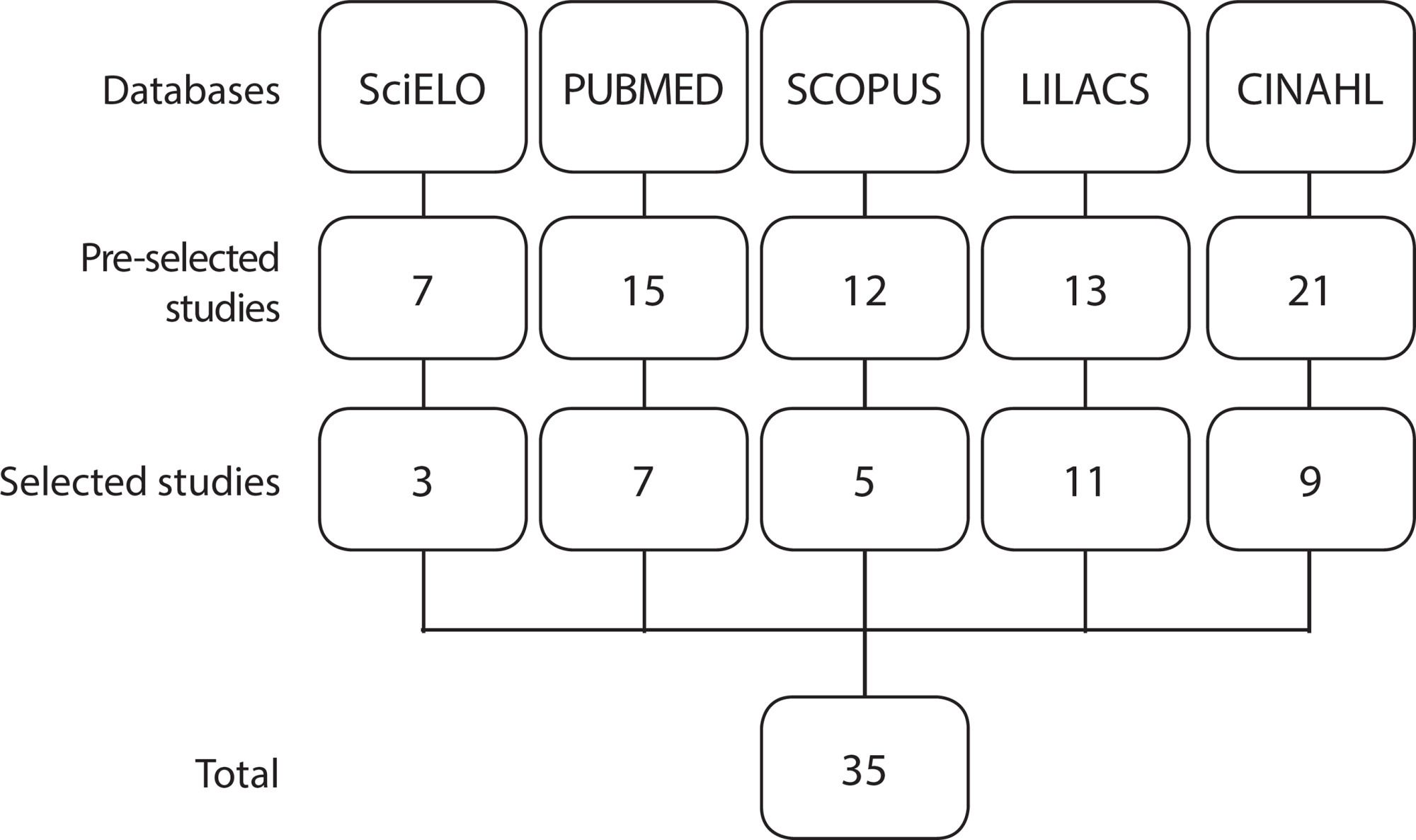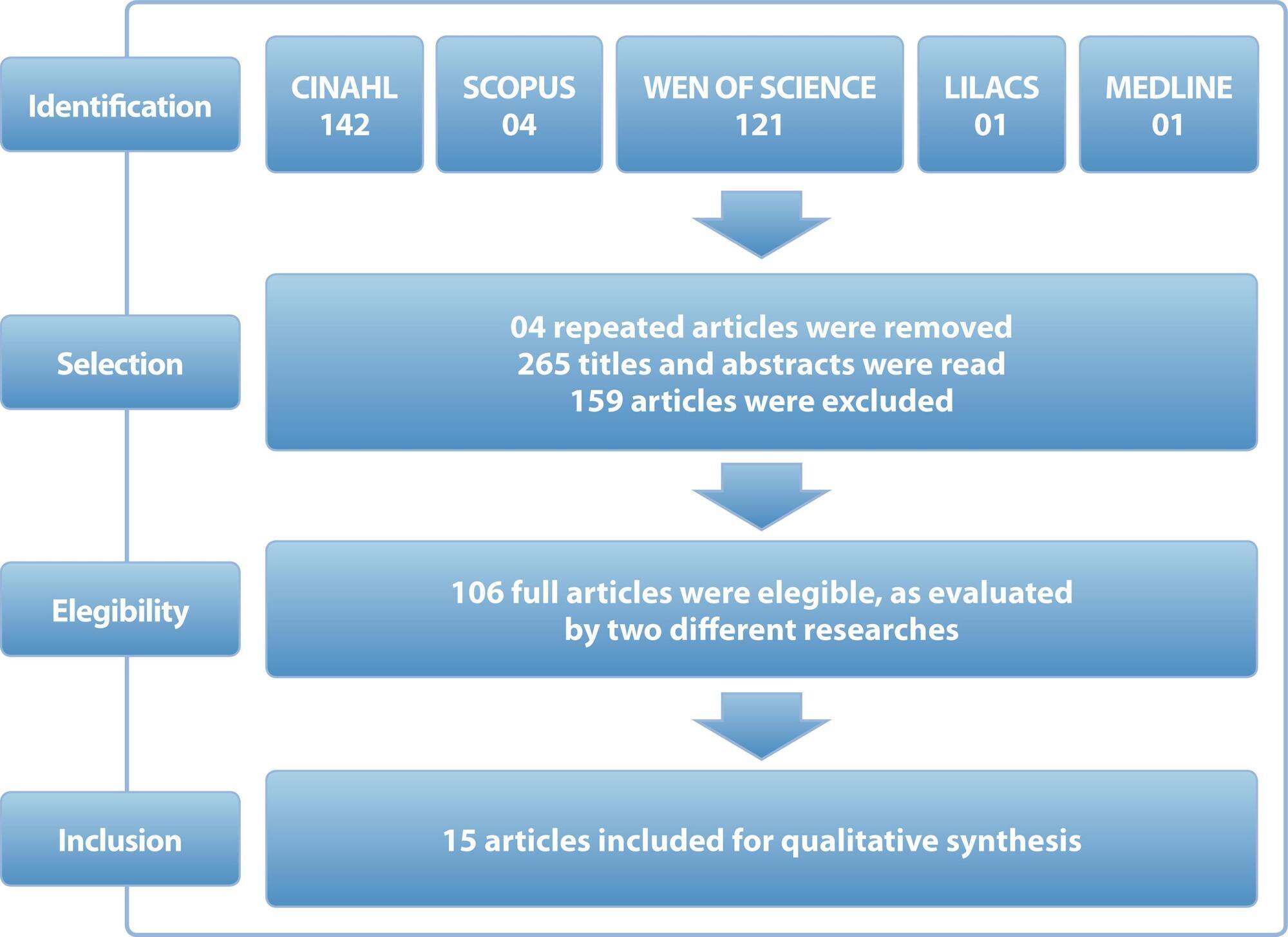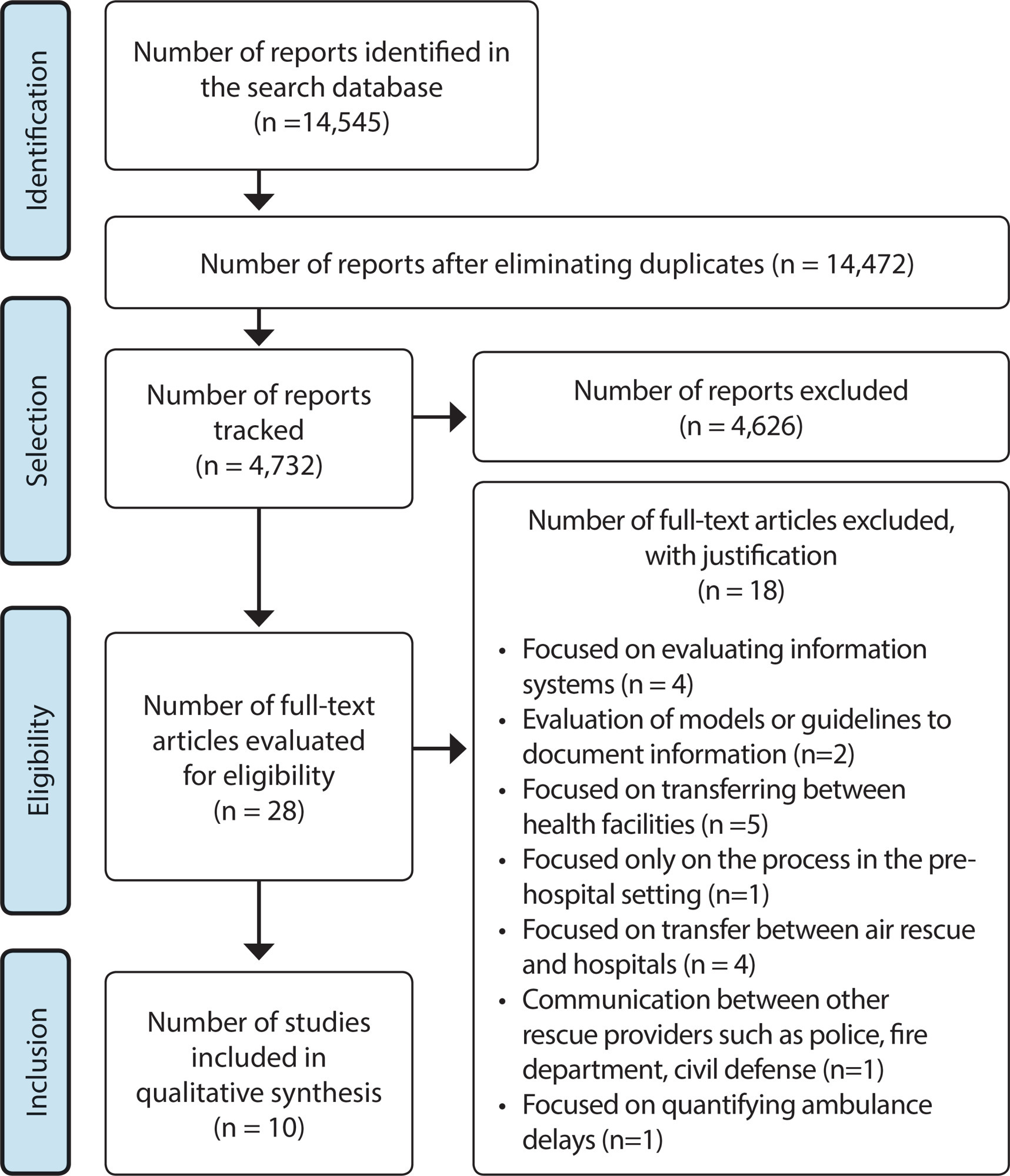-
REVIEW01-01-2017
Nursing process in mental health: an integrative literature review
Revista Brasileira de Enfermagem. 2017;70(1):220-230
Abstract
REVIEWNursing process in mental health: an integrative literature review
Revista Brasileira de Enfermagem. 2017;70(1):220-230
DOI 10.1590/0034-7167-2016-0031
Views0See moreABSTRACT
Objective:
to identify evidences from the literature on the application of nursing process in care developed by the nurse in mental health.
Method:
integrative literature review between 1990 and 2013, in the PubMed, Scopus, CINAHL and LILCACS bases. Descriptors: nursing processes, mental health, nursing care.
Results:
19 papers were identified. Limited and partial usage of the nursing process in care established by a therapeutic relationship that respects the patient’s individuality. We observe care proposals systematized for patients that present pathological aspects in the limits between the physical and psychical, which might be a response to the influence of the practice based on evidences.
Conclusion:
it was found an antagonistic movement between care based on the relationship and located in the standardization of diagnoses that respond to physical malaise. A lack of evidence was verified for the usage of the nursing process in mental health, and we point at the necessity for the creation of new possibilities for dialogue between relational and biological perspectives.
-
REVIEW01-01-2017
Nursing practice in home care: an integrative literature review
Revista Brasileira de Enfermagem. 2017;70(1):210-219
Abstract
REVIEWNursing practice in home care: an integrative literature review
Revista Brasileira de Enfermagem. 2017;70(1):210-219
DOI 10.1590/0034-7167-2016-0214
Views0See moreABSTRACT
Objective:
analyze scientific production on nursing practice in home care.
Method:
integrative review employing databases LILACS, BDENF, IBECS, and MEDLINE. Studies in Spanish, English, and Portuguese were included, regardless of publishing date.
Results:
after analyzing 48 articles, it was found that nursing practice in home care is complex, employing a multitude of actions by using three technologies: soft; soft-hard especially; and hard. Challenges related to the home-care training process are reported in the literature. Nurses use knowledge from their experience and scientific recommendations in conjunction with their reflections on the practice.
Conclusion:
home nursing practice is fundamental and widespread. Relational and educational actions stand out as necessary even in technical care, with a predominant need for home-care training.

-
REVIEW01-01-2017
Nonpharmacological interventions to improve quality of life in heart failure: an integrative review
Revista Brasileira de Enfermagem. 2017;70(1):198-209
Abstract
REVIEWNonpharmacological interventions to improve quality of life in heart failure: an integrative review
Revista Brasileira de Enfermagem. 2017;70(1):198-209
DOI 10.1590/0034-7167-2016-0112
Views0See moreABSTRACT
Objective:
to identify articles that assessed the effectiveness or efficacy of nonpharmacological interventions to improve quality of life of people with heart failure in the literature.
Method:
an integrative literature review was performed in Lilacs, MedLine and SciELO databases, including randomized or nonrandomized clinical trials and quasi-experimental studies published between 2003 and 2014, in Portuguese, English or Spanish.
Results:
twenty-three studies were included. The categories of nonpharmacological interventions that improved quality of life of people with heart failure were: Remote health monitoring, Instructions on health practices, Physical activity follow-up and Traditional Chinese Medicine practices.
Conclusion:
these results can guide the selection of interventions to be implemented by health professionals that treat people with heart failure. Future systematic reviews with meta-analyses are needed in order to identify the most effective interventions for improving these individuals’ quality of life.

-
REVIEW01-01-2017
Quality of working life: assessment of intervention studies
Revista Brasileira de Enfermagem. 2017;70(1):189-197
Abstract
REVIEWQuality of working life: assessment of intervention studies
Revista Brasileira de Enfermagem. 2017;70(1):189-197
DOI 10.1590/0034-7167-2015-0069
Views0See moreABSTRACT
Objective:
to analyze the production of knowledge about interventions on quality of working life.
Method:
integrative review study. The following databases were used for study selection: SciELO, Medline and PubMed.
Results:
the sample included 25 national and international articles that described programs and methods to acquire healthy habits at the workplace and attenuate its mental demands.
Conclusion:
by observing the number of businesses throughout the world, a low number of programs addressing workers’ health and well-being can be found, and the establishment of efficient policies at institutions could improve this situation.

-
REVIEW01-01-2017
Health literacy for people living with HIV/Aids: an integrative review
Revista Brasileira de Enfermagem. 2017;70(1):180-188
Abstract
REVIEWHealth literacy for people living with HIV/Aids: an integrative review
Revista Brasileira de Enfermagem. 2017;70(1):180-188
DOI 10.1590/0034-7167-2015-0052
Views0See moreABSTRACT
Objective:
to analyze knowledge produced by research about health literacy for adult with HIV/Aids.
Method:
an integrative literature review, using six databases, was conducted between January and April of 2014. The descriptors aids and Health Literacy were used, in Portuguese, English and Spanish. A total of 130 articles were found and 14 were selected. Three categories were identified: educational technologies and health literacy for HIV/Aids; assessment of health literacy of patients with HIV/Aids; and health literacy and adherence to antiretroviral therapy.
Results:
analysis of health literacy, socioeconomic status and educational level of people living with HIV/ Aids was essential for implementation of educational strategies that increased adherence to health guidance.
Conclusion:
this study showed the importance of health literacy for working with people living with HIV/Aids, especially considering individuals who did not possess the minimum necessary for survival, which makes it relevant and encourages further research on the topic.

-
REVIEW01-01-2017
Letramento em saúde para pessoas com HIV/Aids: revisão integrativa
Revista Brasileira de Enfermagem. 2017;70(1):180-188
Abstract
REVIEWLetramento em saúde para pessoas com HIV/Aids: revisão integrativa
Revista Brasileira de Enfermagem. 2017;70(1):180-188
DOI 10.1590/0034-7167-2015-0052
Views1See moreRESUMEN
Objetivo:
analizar el conocimiento producido por la investigación sobre la salud de alfabetización para adultos con VIH/SIDA.
Método:
una revisión integradora de la literatura, con seis bases de datos, se llevó a cabo entre enero y abril de 2014. Los descriptores SIDA y Educación de la Salud se utilizaron, en portugués, inglés y español. Se encontró un total de 130 artículos y se seleccionaron 14. Se identificaron tres categorías: tecnologías de la educación y alfabetización de la salud para el VIH/SIDA; evaluación de conocimientos sobre la salud de los pacientes con VIH/SIDA; y conocimientos sobre la salud y la adherencia a la terapia antirretroviral.
Resultados:
análisis de los conocimientos sobre la salud, el estatus socioeconómico y nivel educativo de las personas que viven con el VIH / SIDA era esencial para la implementación de estrategias educativas que el aumento de la adherencia a la orientación de la salud.
Conclusión:
Este estudio demostró la importancia de la alfabetización en salud para trabajar con personas que viven con el VIH / SIDA, especialmente teniendo en cuenta a las personas que no poseen el mínimo necesario para la supervivencia, lo que hace que sea aún más relevante y alienta la investigación sobre el tema.
-
Factors that interfere with the response of nurses in the monitoring of clinical alarms
Revista Brasileira de Enfermagem. 2017;70(1):172-179
Abstract
Factors that interfere with the response of nurses in the monitoring of clinical alarms
Revista Brasileira de Enfermagem. 2017;70(1):172-179
DOI 10.1590/0034-7167-2015-0092
Views0See moreABSTRACT
Objective:
The objective of the present study was to identify and synthesize the best empirical evidence found on factors that influence the response of nurses regarding clinical alarms.
Method:
An integrative literature review was conducted with searches undertaken in ten electronic databases restricted to the period from 2005 to 2016.
Results:
Eight articles were included by cross-checking the descriptors selected.
Conclusion:
In the analysis of the studies, the following possible factors that might interfere with the response of nurses in the monitoring of clinical alarms were found: high number of false alarms, inaudibility of alarms due to the competition of sounds, difficulty in distinguishing the urgency of alarms, and increase in noise caused by the raise in the number of alarms.
-
RESEARCH01-01-2017
Discourses on discharge care for children with special healthcare needs
Revista Brasileira de Enfermagem. 2017;70(1):163-171
Abstract
RESEARCHDiscourses on discharge care for children with special healthcare needs
Revista Brasileira de Enfermagem. 2017;70(1):163-171
DOI 10.1590/0034-7167-2016-0248
Views0See moreABSTRACT
Objectives:
analyze the discourse of healthcare professionals and families on the continuous and complex care for children with special healthcare needs; understand hospital discharge as a process centered on children demands and family learning.
Method:
qualitative research conducted between 2013 and 2015 through semi-structured interviews, document analysis and the sensitive creative method; the participants were ten children with special healthcare needs, six professionals and eleven family members from a public pediatric teaching hospital in Rio de Janeiro. The data underwent critical discourse analysis.
Results:
at discharge, family caregivers should learn innovative care to guarantee the maintenance of their children’s lives at home, but preparation is limited.
Conclusion:
the clinicians and the families pointed out Nurse as the most qualified professional for this preparation, since caring for these children requires nursing care skills.
-
ORIGINAL ARTICLE03-09-2020
Quality of life at work in a central sterile processing department
Revista Brasileira de Enfermagem. 2020;73(2):e20180792
Abstract
ORIGINAL ARTICLEQuality of life at work in a central sterile processing department
Revista Brasileira de Enfermagem. 2020;73(2):e20180792
DOI 10.1590/0034-7167-2018-0792
Views1See moreABSTRACT
Objectives:
to evaluate the quality of life of nursing professionals who work in a central sterile processing department.
Methods:
a descriptive, quantitative, exploratory study, conducted with 82 nursing professionals working in the Central Sterile Processing Department of a University Hospital, from September to November 2017. A semi-structured instrument and the questionnaire “Medical Outcomes Study Short-Form 36” were used. Results: most of the participants were female, married, aged 31-40 years; 47.6% with 6-10 years of profession, and 82.9% reported working in CSPD for 1-5 years. The most affected quality of life domains were Pain, Vitality, General Health Status and Social Aspects.
Conclusions:
This study showed a need for rethinking and re-creating the labor dynamics in CSPD to improve the quality of life of these nursing professionals.
-
ORIGINAL ARTICLE07-06-2020
Nurses’ work process in an emergency hospital service
Revista Brasileira de Enfermagem. 2020;73(5):e20180923
Abstract
ORIGINAL ARTICLENurses’ work process in an emergency hospital service
Revista Brasileira de Enfermagem. 2020;73(5):e20180923
DOI 10.1590/0034-7167-2018-0923
Views1ABSTRACT
Objectives:
to analyze the nurses’ work process in an Emergency Hospital Service.
Methods:
a qualitative, exploratory and descriptive research conducted with 17 nurses from the emergency service of a high complexity hospital in southern Brazil. Data were collected through interviews, focus group and document analysis. Data analysis followed the thematic content analysis framework.
Results:
four categories emerged: Work environment characteristics; Assistance dimension; Management dimension; Care management.
Final Considerations:
the nurses’ work process in Emergency Hospital Service is characterized by the peculiarities of the setting, with centrality in care and care management aiming at quality care and safety to patients.
Keywords:Emergency NursingEmergency Service, HospitalHealth ManagementNurse's RoleProfessional PracticeSee more -
REVIEW07-13-2020
The quality of life of family health professionals: a systematic review and meta-synthesis
Revista Brasileira de Enfermagem. 2020;73(5):e20190645
Abstract
REVIEWThe quality of life of family health professionals: a systematic review and meta-synthesis
Revista Brasileira de Enfermagem. 2020;73(5):e20190645
DOI 10.1590/0034-7167-2019-0645
Views1See moreABSTRACT
Objectives:
to perform a systematic review and meta-synthesis of qualitative studies about the work-related quality of life of Family Health Strategy professionals.
Methods:
this systematic review was developed to answer the following PVO question: “Which factors (variables) are associated with the work-related quality of life (outcome) of Family Health Strategy professionals (population)?” The PubMed, Scopus, Embase, SciELO, Web of Science, LILACS, Science Direct, OpenThesis, OpenGrey, and OATD databases were selected. The meta-synthesis analyzed the main codes and secondary codes of all included studies.
Results:
the database search resulted in 1,744 reports; six were considered eligible for the meta-synthesis. Four factors were considered for the quality of work life: working conditions; work processes; interpersonal relationships; and personal aspects.
Conclusions:
although this study confirms the adequacy of aspects commonly related to the quality of work life, other factors are important in the case of FHS professionals, especially work context.

-
REVIEW11-06-2020
Transitional care to caregivers of dependent older people: an integrative literature review
Revista Brasileira de Enfermagem. 2020;73:e20200394
Abstract
REVIEWTransitional care to caregivers of dependent older people: an integrative literature review
Revista Brasileira de Enfermagem. 2020;73:e20200394
DOI 10.1590/0034-7167-2020-0394
Views1See moreABSTRACT
Objective:
To identify the needs of caregivers of dependent older people related to self-care in the transition from hospital to home.
Methods:
Integrative literature review that followed a predefined protocol, carried out from March to May 2019 in the platforms EBSCO, B-On, Scopus, Web of Science, and Joanna Briggs Institute. Descriptors and eligibility criteria were defined for the bibliographic sample, which was ten articles. The search was limited to articles published between 2015 and 2019 to guarantee evidence topicality.
Results:
The needs of caregivers related to transitional care can be grouped into five categories: needs in the transition into the role of caregiver; needs related to self-care of caregivers themselves; health needs; economic needs; and social and collective needs.
Final considerations:
The work developed by nurses regarding transitional care of caregivers must have two focuses: managing care provided to dependent older people and managing the needs of caregivers and the care offered to them.

-
REVIEW09-21-2020
Middle range theory for the nursing diagnosis Excess Fluid Volume in pregnant women
Revista Brasileira de Enfermagem. 2020;73:e20190334
Abstract
REVIEWMiddle range theory for the nursing diagnosis Excess Fluid Volume in pregnant women
Revista Brasileira de Enfermagem. 2020;73:e20190334
DOI 10.1590/0034-7167-2019-0334
Views1See moreABSTRACT
Objective:
To stablish a middle range theory for the understanding of the causal mechanisms and clinical consequentes of the nursing diagnosis Excess Fluid Volume (00026) among pregnant women.
Method:
The Middle Range Theory was constructed in five stages: defining of construction approach, establishing main concepts, elaborating propositions, developing a pictorial diagram, and establishing the causal relationships and evidence for practice of the Middle Range Theory.
Results:
We identified 14 clinical indicators and 6 causal factors of Excess Fluid Volume. A pictorial diagram was developed and relationships between Excess Fluid Volume elements were established with 6 propositions for them.
Conclusion:
The Middle Range Theory included both physiological and pathological conditions to explain Excess Fluid Volume. This Middle Range Theory might help in the better understanding of interactions between causal factors and clinical indicators of Excess Fluid Volume.

-
Real and illusory perceptions of patients in induced coma
Revista Brasileira de Enfermagem. 2019;72(3):818-824
Abstract
Real and illusory perceptions of patients in induced coma
Revista Brasileira de Enfermagem. 2019;72(3):818-824
DOI 10.1590/0034-7167-2017-0906
Views1See moreABSTRACT
Objective:
To identify, in the scientific literature, real and illusory perceptions of adult patients in induced coma.
Methods:
This is an integrative review of 15 primary studies from the Medline, Web of Science, LILACS, CINAHL and SCOPUS databases.
Results:
The main memories reported after induced coma were thirst, cold, and pain. In some studies, patients reported they were unable to tell whether they were awake or dreaming, whether it was real or unreal. Satisfactory memories were reported by patients related to the care received and the use of bedside journals.
Conclusion:
Evidence showed a number of studies aiming to identify delirium, but without a focus on analyzing real or illusory perceptions of patients after induced coma. Thus, this integrative review identified scientific evidence of memories related to perceptions of sedated patients in the intensive care unit.

-
REVIEW12-21-2020
Communication between pre-hospital and intra-hospital emergency medical services: literature review
Revista Brasileira de Enfermagem. 2020;73:e20190817
Abstract
REVIEWCommunication between pre-hospital and intra-hospital emergency medical services: literature review
Revista Brasileira de Enfermagem. 2020;73:e20190817
DOI 10.1590/0034-7167-2019-0817
Views1ABSTRACT
Objectives:
to analyze, according to the scientific literature, communication strategies in the transfer of cases between pre-hospital and in-hospital services and their contributions to patient safety.
Methods:
this is a literature review study, that is, one that aims to gather and synthesize research results on the subject in a systematic and orderly manner.
Results:
ten articles were published, published between 2010 and 2018, and two points of discussion emerged: use of mnemonics; and barriers to transferring a case.
Conclusions:
studies point to the need to standardize the case transfer process, as well as integrative training of professionals, regular assessment of the teams involved in emergency medical services and the need for research on the subject.
Keywords:AmbulanceCommunicationEmergency Medical ServicesReviewTransfer of Responsibility by the PatientSee more
-
ORIGINAL ARTICLE03-24-2021
Health promotion actions in the School Health Program in Ceará: nursing contributions
Revista Brasileira de Enfermagem. 2021;74(1):e20190769
Abstract
ORIGINAL ARTICLEHealth promotion actions in the School Health Program in Ceará: nursing contributions
Revista Brasileira de Enfermagem. 2021;74(1):e20190769
DOI 10.1590/0034-7167-2019-0769
Views1See moreABSTRACT
Objectives:
to compare health promotion actions carried out by Family Health teams in Ceará, linked to the School Health Program.
Methods:
a cross-sectional study involving the first and second cycles of an external assessment of 910 and 1,626 teams from 184 municipalities, which joined the Brazilian National Program for Improvement of Access and Quality of Primary Care. Eight clinical assessment and seven health promotion indicators were assessed, together with health professionals working in schools.
Results:
the interviewees were nurses (95.6% and 98.3%). Between the cycles, there was an increase in clinical assessment (78.7% and 91.3%), health promotion and disease prevention (82.5% and 89.3%) and survey of students for follow-up (41.4% and 66.4%) in schools.
Conclusions:
health actions at school advanced between cycles, with nurses as protagonists in school health, which can reduce vulnerabilities in children and adolescents and qualify Primary Care.
Search
Search in:
Nuvem de Tags
Aged (144) Atenção Primária à Saúde (239) COVID-19 (104) Cuidados de Enfermagem (269) Educação em Enfermagem (151) Educação em Saúde (139) Enfermagem (930) Estudos de Validação (131) Health Education (144) Idoso (208) Mental Health (149) Nursing (987) Nursing Care (306) Patient Safety (151) Primary Health Care (284) Qualidade de Vida (104) Quality of Life (106) Saúde Mental (145) Segurança do Paciente (150) Validation Studies (108)



